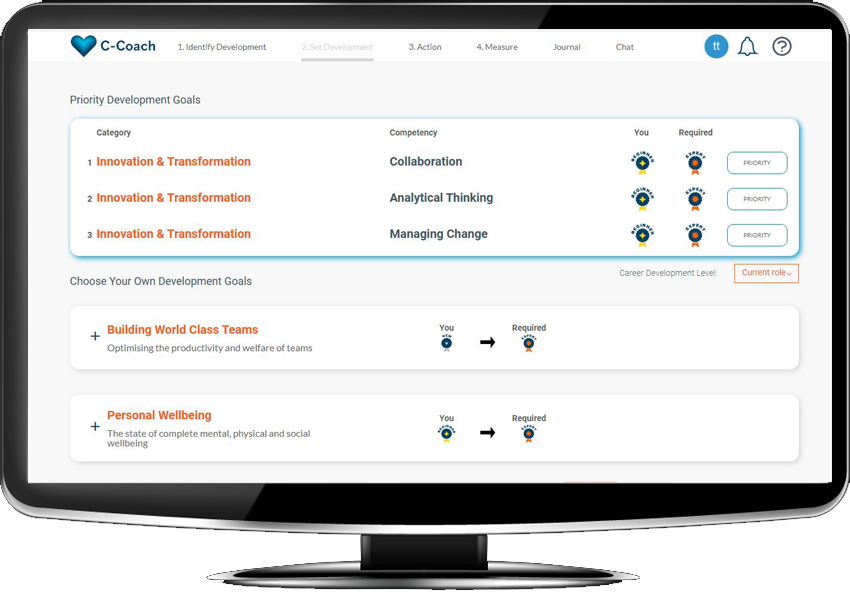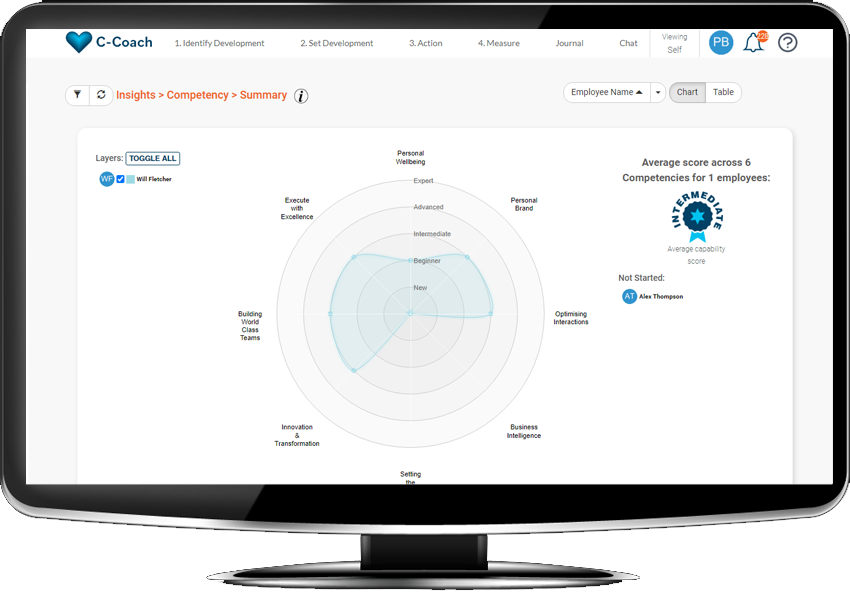Revolutionise Your
Workforce Development
Comprehensive, Personalised, and Scalable Soft Skills Development
A Proven System for Lasting Behavioural Change
Underpinned by psychology, neuroscience, and systems thinking methodologies, along with technology-driven insights and structured reinforcement, C-Coach ensures organisations create thriving, high-performance cultures—rooted in care, measured in results, and scaled for growth.
At the heart of this system are three interconnected models that drive clarity, alignment, and measurable impact:
- DISAM Framework – Define, Identify, Set, Act, Measure – A structured roadmap for defining, diagnosing, and embedding behavioural change.
- Stakeholder Synergy Model (SSM) – A system that ensures accountability across individuals, managers, and leadership, reinforcing lasting transformation.
- The 7 C’s of High-Performance Culture –The 7 C’s define the environment where people, performance, and innovation thrive.
Each model plays a key role in simplifying complexity, aligning growth with business objectives, and making change stick.

1. DISAM Framework – The Roadmap for Behavioural Transformation
- Define – Establish clear behavioural expectations for success.
- Identify – Diagnose current behaviours and pinpoint key development areas.
- Set – Prioritise high-impact actions to embed real change.
- Act – Reinforce behaviours through structured learning, tools, and collaboration.
- Measure – Track progress with real-time insights, gamification, and reinforcement tools.
Transformation doesn’t happen in isolation. SSM (Stakeholder Synergy Model) adds value and accountability to every stakeholder, embedding change, improving performance, and creating a continuous cycle of growth.
- Individuals take ownership of their development.
- Managers become facilitators of growth using real-time insights.
- Leadership gains intelligence and the tools to drive meaningful change
2. Stakeholder Synergy Model
Transformation doesn’t happen in isolation. SSM (Stakeholder Synergy Model) adds value and accountability to every stakeholder, embedding change, improving performance, and creating a continuous cycle of growth.
- Individuals take ownership of their development.
- Managers become facilitators of growth using real-time insights.
- Leadership gains intelligence and the tools to drive meaningful change


3. The 7 C’s: The Cultural Foundation for High-Performance Workplaces
Sustainable Change Needs the Right Culture
Underpinning the DISAM and SSM models are the cultural factors that enable sustainable transformation at every level—individuals, teams, and organisations. These 7 C’s define the environment in which people, performance, and innovation thrive.
The 7 C’s of High-Performance Culture:
- Care – Valuing people, fostering trust, and creating meaningful impact.
- Clarity – Ensuring alignment on goals, expectations, and performance drivers.
- Competence – Providing the right skills, tools, and knowledge for sustainable success.
- Commitment – Cultivating accountability and a mindset of continuous improvement.
- Connection – Strengthening teamwork, collaboration, and shared purpose.
- Curiosity – Encouraging adaptability, challenge, and innovative thinking.
- Courage – Empowering resilience, bold decisions, and meaningful growth.
DISAM Framework - Details
1. Define
Set standards and benchmarks for your business.
- Blueprint: Our best-in-class soft skills framework captures the knowledge, skills, experience and confidence the business needs to deliver its strategy.
- Defining Excellence: We help you define the consistent, tangible, and measurable standards of excellence for all roles.
Line Managers
- Targeted Coaching: Managers have a framework of predefined standards and expectations, along with access to insights, to effectively coach individuals based on their self-identified strengths and areas for improvement.
- Continual Improvement Culture: The consistent and tangible framework enables open, honest and supportive action with individuals and teams fostering a culture of feedback and continual improvement
- Supportive Development Conversations: Managers are upskilled to hold supportive and constructive development conversations with their team members.
- Raising Confidence and Competence: Hands-on workshops ensure managers are equipped to drive meaningful change and optimise technology.
- Blueprint: Our best-in-class soft skills framework captures the knowledge, skills, experience and confidence the business needs to deliver its strategy.
- Defining Excellence: We help you define the consistent, tangible, and measurable standards of excellence for all roles.
Line Managers
- Targeted Coaching: Managers have a framework of predefined standards and expectations, along with access to insights, to effectively coach individuals based on their self-identified strengths and areas for improvement.
- Continual Improvement Culture: The consistent and tangible framework enables open, honest and supportive action with individuals and teams fostering a culture of feedback and continual improvement
- Supportive Development Conversations: Managers are upskilled to hold supportive and constructive development conversations with their team members.
- Raising Confidence and Competence: Hands-on workshops ensure managers are equipped to drive meaningful change and optimise technology.


2. Identify
Users self-assess to pinpoint strengths and gaps.
- Assessment: C-Coach assesses the Individual’s current knowledge, skills, experience and confidence through tailored questions, raising self-awareness, and clarifying company standards.
- Customisation: Based on the assessment, the platform customises learning paths that are specifically designed to address the unique needs and goals of each individual, against predefined role and company standards.
Line Managers
- Actionable Feedback: Managers have a framework of predefined standards and expectations alongside access to insights that equip them to coach against an individual’s self-identified strengths and areas for improvement. Providing a framework for open, honest and supportive action.
- Open Feedback Culture: C-Coach fosters a culture of open and honest feedback within teams.
- Assessment: C-Coach assesses the Individual’s current knowledge, skills, experience and confidence through tailored questions, raising self-awareness, and clarifying company standards.
- Customisation: Based on the assessment, the platform customises learning paths that are specifically designed to address the unique needs and goals of each individual, against predefined role and company standards.
Line Managers
- Actionable Feedback: Managers have a framework of predefined standards and expectations alongside access to insights that equip them to coach against an individual’s self-identified strengths and areas for improvement. Providing a framework for open, honest and supportive action.
- Open Feedback Culture: C-Coach fosters a culture of open and honest feedback within teams.
3. Set
Develop personalised growth plans.
- Self-driven: Identifies marginal gain opportunities and prioritises development needs against an individual’s specific role level expectations and equips individuals to choose and accept which areas of development they action.
- Development resources: Immediate access to a curated range of development resources (4k+) including video, reading, podcast and connections with other learners and experts
- Career Development: Identifies the priority learning path and recommends development required to ready an individual to succeed in their aspirational career role.
- Objectives: Equips individuals to capture their objectives, connect learning to goals and seamlessly capture evidence of progression.
Line Managers
- Targeted Support: Managers are able to see prioritised development areas and provide focused support, identify on the job and cross business development opportunities.
- Recognition: With the increased awareness of individual’s proactivity to grow, managers can support and recognise positive efforts
- Self-driven: Identifies marginal gain opportunities and prioritises development needs against an individual’s specific role level expectations and equips individuals to choose and accept which areas of development they action.
- Development resources: Immediate access to a curated range of development resources (4k+) including video, reading, podcast and connections with other learners and experts
- Career Development: Identifies the priority learning path and recommends development required to ready an individual to succeed in their aspirational career role.
- Objectives: Equips individuals to capture their objectives, connect learning to goals and seamlessly capture evidence of progression.
Line Managers
- Targeted Support: Managers are able to see prioritised development areas and provide focused support, identify on the job and cross business development opportunities.
- Recognition: With the increased awareness of individual’s proactivity to grow, managers can support and recognise positive efforts.


4. Action
Engage with curated learning modules.
- Micro Lessons: Engage in short, impactful learning modules (5 to 20 minutes) that fit seamlessly into a busy individual’s schedule.
- In-the-Flow Learning: Integrate learning activities into daily routines to ensure continuous practice and reinforcement.
- Flexible Access: Access learning modules anytime, anywhere.
- Journaling: Supports wellbeing, reflection, and documentation of learning.
Line Managers
- Targeted Training: Specific modules focus on essential leadership skills, including performance appraisal, coaching, feedback, conflict management, and team building.
- Micro Lessons: Engage in short, impactful learning modules (5 to 20 minutes) that fit seamlessly into a busy individual’s schedule.
- In-the-Flow Learning: Integrate learning activities into daily routines to ensure continuous practice and reinforcement.
- Flexible Access: Access learning modules anytime, anywhere.
- Journaling: Supports wellbeing, reflection, and documentation of learning.
Line Managers
- Targeted Training: Specific modules focus on essential leadership skills, including performance appraisal, coaching, feedback, conflict management, and team building.
5. Measure
Track progress and impact with detailed analytics.
- Progress Tracking: Gamified dashboards and tools keep individuals motivated.
- Nudges and Reminders: Platform and email notifications help identify action requirements.
Line Managers
- Performance Metrics: Understand team progress with detailed metrics on engagement, completion rates, and skill acquisition.
- Identifying Skill Gaps: Use data analytics to target development efforts effectively.
- Data-Driven Decisions: Make informed decisions about talent management and organisational development.
- Engagement Analytics: Adjust and improve training initiatives based on engagement data.
- Retention Indicators: Predict and address potential turnover risks.
- ROI Measurement: Track the impact of your Workforce Optimisation Programmes to validate the investment.
- Progress Tracking: Gamified dashboards and tools keep individuals motivated.
- Nudges and Reminders: Platform and email notifications help identify action requirements.
Line Managers
- Performance Metrics: Understand team progress with detailed metrics on engagement, completion rates, and skill acquisition.
- Identifying Skill Gaps: Use data analytics to target development efforts effectively.
- Data-Driven Decisions: Make informed decisions about talent management and organisational development.
- Engagement Analytics: Adjust and improve training initiatives based on engagement data.
- Retention Indicators: Predict and address potential turnover risks.
- ROI Measurement: Track the impact of your Workforce Optimisation Programmes to validate the investment.

Real-World Applications
- Talent Management: Identify and nurture high-potential employees for a robust succession and leadership pipeline.
- Codify Best Practices: Utilise trend data to support targeted development.
- Performance Reviews: Conduct objective and insightful reviews focusing on skill development and behavioural changes.
- Training Optimisation: Ensure training programs are effective and aligned with goals.
- Employee Well-Being: Monitor and support well-being by identifying stress points and providing timely interventions.
Contact Us
Want to talk it through? Leave your contact details and a member of the team will be in touch shortly.
Contact Us
Want to talk it through? Leave your contact details and a member of the team will be in touch shortly.
